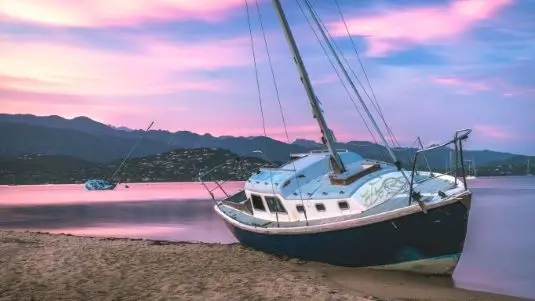On March 23, 1989, the colossal oil tanker Exxon Valdez, carrying 54 million gallons of Alaskan North Slope crude oil, prepared for its journey south to California. In the course of 8,700 previous voyages, heavily laden oil tankers had safely made this same journey out of Prince William Sound. Surely the crew of Exxon Valdez would do the same.
Sometimes I find it helpful to take events like the Exxon Valdez oil spill, pull them apart, tease them in my mind, and see what spiritual lessons they offer.
Baggage
It’s fascinating that from the moment the Exxon Valdez pulled out of its moorings and began to move down Prince William Sound, almost twenty minutes before impact, it could have turned and avoided the Bligh Reef upon which it eventually ran aground. But a 200,000-ton tanker is slow to move and especially to turn, and by the nineteen-minute mark there was no way to change course.
We can’t turn and respond to the still, small voice of God if we’re carrying a lot of excess baggage. Having just defeated the priests of Baal at Mount Carmel, Elijah was once again on Queen Jezebel’s hit list. His initial response was to hide in a cave, becoming stuck on his fears (1 Kings 19:9-14).
We need to determine what gets stuck in our heads, excess baggage that prevents us from maneuvering. Getting on our knees every day and leaving our baggage with God will free us up to do His will.
Navigation
In hindsight, the crew of the Exxon Valdez made some critical navigation errors by crossing shipping lanes. With the intention of avoiding potential icebergs from the Columbia Glacier, they deliberately steered the 166 foot wide vessel well beyond the 3,280 foot wide designated shipping lane.
“Enter by the narrow gate; for wide is the gate and broad is the way that leads to destruction, and there are many who go in by it. Because narrow is the gate and difficult is the way which leads to life, and there are few who find it.” (Matthew 7:13-14).
Though it may seem intimidating, God’s way is not so narrow that we can’t possibly fit through it. There will be obstacles in our life, icebergs, but with the right frame of mind and our eyes on the goal, we can stay on the path. We are not the first to walk this way; our spiritual forebears are listed in Hebrews 11. It can be done.
Clean Up
The first hour of an oil spill has proven to be critical in initiating the cleanup process. Nevertheless, the captain of the Exxon Valdez spent forty-one precious minutes trying to free the ship’s rudder from the reef before finally reporting his situation. He wanted to hide his mistake.
We need to admit our mistakes quickly and not try to hide them from God. We must own up to our failures, ask for the prayers of others, and give ours in return (James 5:16). These are vital steps in building trust and confidence as we relate to others. Healing takes work, and time.
Come the day, God can create a new Prince William Sound, free of oil damage in the blink of an eye. It won’t be hard for Him to fix the devastation of the Exxon Valdez disaster. We are God’s human creation, and though He can renew us, what He can’t do for us is our part in the development of His holy, righteous character.
We must choose daily to eject excess baggage, stay on the narrow path, and quickly confess our sins. With our participation God can help us to avoid disaster and keep us moving along the path to the Family of God.
Ben Orchard


